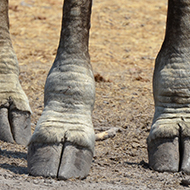Company and food helps hooved animals in captivity, study finds

"There are lessons here for both farmers and zoos about how best to raise and treat livestock” -Kate Lewis, University of Portsmouth.
Hooved animals in captivity require access to the right food and company to be happy and healthy, new research has found.
Researchers at Aberystwyth and Portsmouth Universities examined the behaviour of some 15,000 individual animals across 38 ungulate – or hooved – species, and found that the type of food species receive and their mating strategy is linked to the risk of stress symptoms.
Species highlighted by the study at most at risk from stress-related habits are those that eat high-growing woody vegetation, such as camels, okapis and rhinos, or those that are promiscuous, like buffalos, yaks, sheep and pigs.
The researchers conclude that behavioural needs should be prioritised to avoid stereotypic behaviours and provide good welfare for ungulates. They also infer that animals in captivity that do not have constant access to food are highly prone to behavioural problems.
Study co-author Dr Sebastian McBride from Aberystwyth University said: “Our data suggest that features of both a species’ wild behavioural biology and captive husbandry are predictive of these stereotypic behaviours in ungulates.
“This research has very important implications for how these large, hoofed animals are kept in captivity – we now have a better understanding of which species are most susceptible to stress in captivity and how we can tackle this problem to improve the welfare of those animals.”
Co-author Dr Leanne Proops, a reader (Associate Professor) in animal behaviour and welfare from the University of Portsmouth added: “This study uses a new method that enables us to better predict how well species that may be rare or understudied will cope in captivity.
“We found that for ungulates, having the right food and social organisation is crucial for their welfare. Whereas for carnivores, having enough space in captivity seems to be key. This shows the importance of understanding the specific needs of different groups of species.”
Study co-author Kate Lewis, from the University of Portsmouth, said: “As a society, we need to continue to question and examine the environmental factors that are important to animals if we are to maximise their welfare. There are lessons here for both farmers and zoos about how best to raise and treat livestock.”
The study Risk factors for stereotypic behaviour in captive ungulates is published in Proceedings of the Royal Society.



 The Veterinary Medicines Directorate (VMD) is inviting applications from veterinary students to attend a one-week extramural studies (EMS) placement in July 2026.
The Veterinary Medicines Directorate (VMD) is inviting applications from veterinary students to attend a one-week extramural studies (EMS) placement in July 2026.